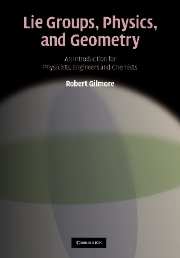Book contents
- Frontmatter
- Contents
- Preface
- 1 Introduction
- 2 Lie groups
- 3 Matrix groups
- 4 Lie algebras
- 5 Matrix algebras
- 6 Operator algebras
- 7 EXPonentiation
- 8 Structure theory for Lie algebras
- 9 Structure theory for simple Lie algebras
- 10 Root spaces and Dynkin diagrams
- 11 Real forms
- 12 Riemannian symmetric spaces
- 13 Contraction
- 14 Hydrogenic atoms
- 15 Maxwell's equations
- 16 Lie groups and differential equations
- Bibliography
- Index
Preface
Published online by Cambridge University Press: 05 September 2012
- Frontmatter
- Contents
- Preface
- 1 Introduction
- 2 Lie groups
- 3 Matrix groups
- 4 Lie algebras
- 5 Matrix algebras
- 6 Operator algebras
- 7 EXPonentiation
- 8 Structure theory for Lie algebras
- 9 Structure theory for simple Lie algebras
- 10 Root spaces and Dynkin diagrams
- 11 Real forms
- 12 Riemannian symmetric spaces
- 13 Contraction
- 14 Hydrogenic atoms
- 15 Maxwell's equations
- 16 Lie groups and differential equations
- Bibliography
- Index
Summary
Many years ago I wrote the book Lie Groups, Lie Algebras, and Some of Their Applications (New York: Wiley, 1974). That was a big book: long and difficult. Over the course of the years I realized that more than 90% of the most useful material in that book could be presented in less than 10% of the space. This realization was accompanied by a promise that some day I would do just that – rewrite and shrink the book to emphasize the most useful aspects in a way that was easy for students to acquire and to assimilate. The present work is the fruit of this promise.
In carrying out the revision I have created a sandwich. Lie group theory has its intellectual underpinnings in Galois theory. In fact, the original purpose of what we now call Lie group theory was to use continuous groups to solve differential (continuous) equations in the spirit that finite groups had been used to solve algebraic (finite) equations. It is rare that a book dedicated to Lie groups begins with Galois groups and includes a chapter dedicated to the applications of Lie group theory to solving differential equations. This book does just that. The first chapter describes Galois theory, and the last chapter shows how to use Lie theory to solve some ordinary differential equations. The fourteen intermediate chapters describe many of the most important aspects of Lie group theory and provide applications of this beautiful subject to several important areas of physics and geometry.
Information
- Type
- Chapter
- Information
- Lie Groups, Physics, and GeometryAn Introduction for Physicists, Engineers and Chemists, pp. xi - xiiPublisher: Cambridge University PressPrint publication year: 2008
